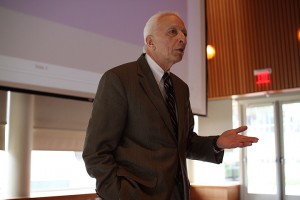This past week, Richard Benedetto, a professor at American University’s School of Public Affairs and ex-White House reporter for USA Today, lectured in JRC 101 and visited English and Political Science classrooms on campus. His lectures, “What it’s like to cover the White House” and “Political Coverage: Who Are the Media Talking To, Voters or Themselves?” were held in JRC 101 on Monday and Tuesday, respectively. On Wednesday he sat down with S&B reporter Miriam Asaad to answer questions about political reporting.

You said there are things more important than what’s being talked about by the media right now regarding the bin Laden killing. What exactly were you referring to?
What I was saying was that right away the media is talking about the 2012 presidential campaign. Well, that’s still a long way away. But the implications of what the slaying of Osama bin Laden means for the War on Terror are much more important than the 2012 presidential elections. It’s not easy to answer these questions, but that’s where we should be focusing instead of running to the politics.
Considering the media as an institution with so much power, is it irresponsible of them to not focus on what’s important?
It’s not irresponsibility as much as it is a sense of thinking that that’s what the public wants. Often what they think the public wants and what the public needs are two different things and you need to find a balance between them.
The press started off as an institution of social change, what does it do today in that regard?
We do an awful lot of that today, whether it be the mainstream press or the dissident press or the web we provide publicity for the various causes going on, the gay and lesbian rights movement being one of the biggest these days. I think that the media has a lot to do with moving it along. Public attitudes have changed rapidly since then. It was 42 years ago that the very beginnings of the gay rights movement began to start and were approaching a time where a majority of Americans don’t even oppose gay marriage. How did that change come about? Was it because people protested on the streets? Partially, but it was also because the media carried stories about the discrimination and brought it into the public’s mind. It takes time but it moves along.
What’s the most interesting thing that you’ve covered?
The period of time leading up to the invasion of Iraq, the Kuwait War, Bill Clinton’s problems with Monica Lewinsky … I never went to a war zone, I can only talk about political things, they’re not as exciting but they stand out in my mind … There’s so many of them. The election of 2000 and the period after that when it was still in limbo was interesting. Its great having been there during all these historical moments.
You wrote a book called “Politicians Are People Too.” What is it about and what made you title it as such?
I intended to write a memoir about all the politicians I’ve met. As I sat down to write it, I said, ‘Gee, a lot of these politicians are very nice people’ and [the media] malign them a little—we think they’re all crummy and crooked. I then came up with that title out of the clear blue sky, I don’t say anything bad about anybody in there, I say all good things—true stories about all these people that I’ve met including Bill Clinton, George W. Bush, George H. W. Bush, Reagan and some lesser known politicians. I’ve covered politicians for a long, long time and I like most of them, if I hated them I wouldn’t be working this job. They’re mostly pretty good—Democrat, Republican. I think being a politician is one of the hardest things in the world. You have to develop a thick skin because you’re always being scrutinized. Unfortunately politicians have become more guarded because the media are so tough on them. There was a time you could go and have a beer with a politician and the notebook was away and if he would tell an off-color joke or something and you wouldn’t report it, today you would.
Do you think that’s a bad thing?
Yes, they’re human too but you don’t get to know them as people. One of the presidents who got bad press but [the media] still got to know as a person was George W. Bush. He probably let us see him more personally than any other president ever covered. And he was a nice guy, he was fun to be around, you would love him. I know you probably hate him, but if he walked into this room you would like him, not his politics, but you would like him, I could guarantee it. But we never wrote much about that, we should have. Obama doesn’t open up, he doesn’t walk into a room with a bunch of reporters and start slapping them on the back. I think he should loosen up a bit.
What do you think the media should change in the way it reports?
It needs to put more context into stories … if the President says something you report it, but he’s giving just one side of the story—his. There’s another side [and] you need to get that in to give context. We have an opposition party. It’s not the press’ job to be the opposition party but it is the press’ job to seek out the opposition. We don’t do enough of that, we’re in such a hurry to get everything out there every day that there’s not enough time to do the other things, to give it richness and context.


















































